Participatory Action Research (PAR) is a crucial method for appreciating and making use of local knowledge. It can produce knowledge that is useful for enhancing small-scale fisheries and livelihoods based on fishing. A recent project in Nigeria focused on the use of PAR to change the beliefs, dispositions, and interactions between fish smokers and researchers. It demonstrated how PAR stimulated interest among fish smokers in biomass briquettes and a prototype drum smoking kiln. It also encouraged co-ownership of the research and the readiness to use contemporary technology.
In West Africa, firewood is the main energy source used in indigenous and traditional fish-smoking technology. Despite the great demand for traditionally smoked fish in domestic and intra-regional markets, the smoking procedures are characterized by poor drying efficiency, tedium, time wastage, and several occupational hazards for fish smokers. Customers who eat smoked fish may risk exposure to cancer-causing compounds known as Polycyclic Aromatic Hydrocarbons (PAHs) created during the smoking process.
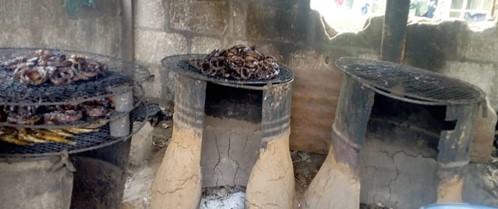
Several studies indicated apathy among fish smokers in fishing communities towards adopting upgraded and domestic fish smoking technologies. Likewise, charcoal has minimal use as an alternate smoke fuel to firewood. Smoking fish with charcoal was said to provide unsatisfactory results compared to firewood-smoked fish. The primary attraction for buyers is the “brownish color” that firewood produces.
In light of this, a group of five Nigerian academics set out to create an alternative energy fish kiln for small-scale female smokers in Lagos, Nigeria. The project was part of Gender Designed in Science, Technology, Engineering, Arts, and Mathematics (STEAM), a 3-year initiative conducted by Carleton University in Ottawa, Canada and financed by the International Development Research Centre, Canada.
The project’s main activities were centered on participatory research between fish smokers and researchers. Prior to the participatory research with fish smokers, we experimented with fish processing using solar drying and charcoal drying, before focusing on biomass briquettes. The biomass briquettes were made of sawdust; water hyacinth and charcoal dust and co-produced with undergraduate students for their research projects.
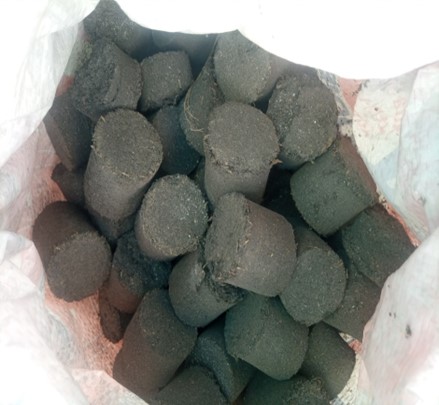
Fourteen fish smokers were selected and invited to a 2-day training workshop in late July 2022. This was done to educate and inform small-scale fish smokers about alternative energy sources for better financial and personal well-being. Two fishermen and two female small-scale aquaculture fish smokers were among the participants recruited from communities where a baseline study had previously been done. A series of training modules with thorough practical demonstrations were presented to the participants. The modules included an explanation of how to dry fish, demonstrated by a hands-on practical. Using biomass briquettes in a small sized grill oven, Kalos Agro Homes, a small-scale commercial manufacturer of biomass briquettes, demonstrated how to dry African catfish. The outcome fascinated the participants and motivated them to replicate the smoking session. Participants were divided into three groups to clean, smoke, and evaluate fresh tilapia based on flavor, taste and appearance/color using three different energy sources: firewood, charcoal, and biomass briquettes. In comparison to charcoal and firewood, briquette-smoked fish received the highest ratings.
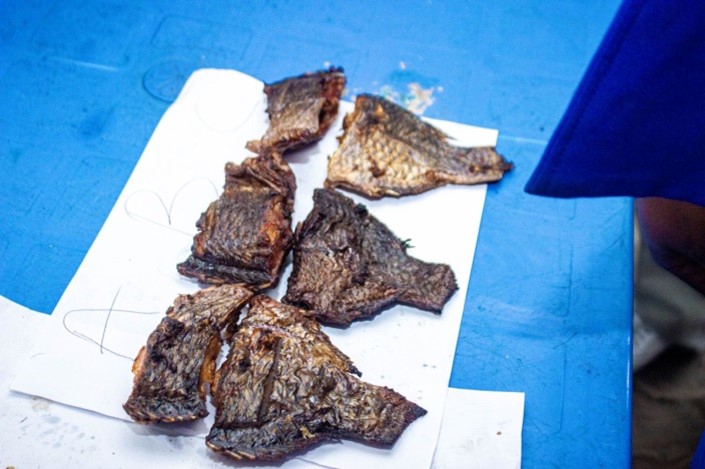
After the workshop, fish smokers were added to a social media platform (What’s App) for continuous engagement. They were encouraged to use biomass briquettes to smoke fish in the kilns/half drums available in their communities, record the process and post the video clips. Two video clips showed the processors smoking fish with biomass briquettes in local half-drum kilns. In a LinkedIn Video Post, a closer look at the smoked fish in the local half drum showed the same attributes as the fish smoked from the modern charcoal smoking kiln. The results achieved by smoking fish in a local drum birthed the idea to upgrade to a modern drum kiln.
Participants conducted step-down training to teach good practices in fish processing to others, from a manual they co-produced with the researchers. They also demonstrated the use of carbonized biomass briquettes as alternative energy sources in three fishing communities in Lagos, Nigeria viz-a viz Ejinrin and Ikosi (inland fishing communities) and Yenawa (a marine fishing community).

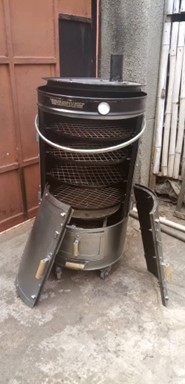
The briquette manufacturer, who is also an engineer, built the drum kiln prototype. Former participants of the training workshop assessed the prototype’s performance on three different trials of fish smoking. The prototype design and construction were modified based on participants’ evaluations and suggestions to create the final version, which is a double-walled and rock wool insulated kiln. It has removable parts, wheels to make moving around easier, a stylish design, and serves multiple purposes. The Director of Fisheries, Lagos State Ministry of Agriculture, attended the December 2022 unveiling of the final prototype. The fish smokers named it, “Irorunde drum smoking kiln” in the Yoruba local language commonly spoken in fishing areas meaning “It gives relief when smoking”.
Fish smokers also provided inputs in the production of a training guide which they used to conduct step-down training in their communities on improved fish smoking practices using biomass briquettes . They naturally became advocates for the use of briquette biomass and hygienic fish processing practices in their communities.
As a result of their cleanliness, lack of smoke, and lack of dark smudges, carbonized briquettes were deemed acceptable by participating fish smokers. They agreed that the briquettes would contribute to their improved health and decent working conditions. Local expertise played a major role in the prototype’s creation. Many fish smokers in fishing communities are knowledgeable about the traditional drum technology; they work on a small scale but lack the financial resources to own contemporary charcoal smoking kilns, which are relatively pricey. Fish smokers received three units of the prototype at discounted prices. The fish smokers’ portion fees will help fund and subsidize additional units for other fish smokers who have expressed interest. The project is all-inclusive. As a way to supplement the preliminary data, beneficiaries will co-produce data on qualitative, quantitative, economic costs, and benefits evaluation.
About the authors
- Kafayat A. Fakoya was the Primary Investigator and is an interdisciplinary researcher with expertise in gender, small scale fisheries, fisheries biology and aquaculture. She affiliated with the Department of Fisheries, Lagos State University, Nigeria and is also the Executive Secretary, Gender in Aquaculture and Fisheries Section.
- Ayojesutomi Abiodun-Solanke was a Co-Primary Investigator, a lecturer at the Federal College of Fisheries and Marine Technology, Lagos and a member of the Gender and Aquaculture and Fisheries Section. She is a PhD Candidate at the University of Ibadan specializing in food safety and quality, fish processing especially fish smoking technology.
- Adenike O. Boyo was a Co-Primary Investigator and specializes in solar radiation utilization for design and construction of solar dryers. Presently, she is the Deputy Vice Chancellor (Administration) at the Lagos State University.
- Shehu L. Akintola was a Co-Primary Investigator and is an interdisciplinary researcher with expertise in contemporary fisheries and aquaculture governance, food climate biodiversity nexus and blue economy. He is the current Dean, Faculty of Science, Lagos State University and Project Coordinator of Vulnerability to Viability (V2V) and Too Big to Ignore in Nigeria.
- Kafayat O. Ajelara was a Co-Primary Investigator and is a lecturer in the Department of Zoology and Environmental Biology, Lagos State University. She specializes in postharvest insect pest control of agricultural and medical importance, biosafety and biosecurity, and also is affiliated with the National Biological Association and Entomological Society of Nigeria.
- Mayowa A. Olasope served in the capacity of a research associate and is a lecturer at the Department of Zoology and Environmental Biology, Lagos State University. She is a parasitologist with an interest in epidemiological and control strategies for parasites of medical and agricultural economic importance.
- Ismot O. Olabamiji was a research assistant and an enumerator. She is a M.Sc candidate student at the Department of Fisheries, Lagos State University.
Acknowledgements
We appreciate the active roles and participation of Engr. Wale Karunwi (Kalos Agro Homes); fieldworkers – Nimah Osho – AbdulGafar, Abiodun Olaide, Bimpe Ogunbote, Mistura Olaleye, Adeola King; and the fish smokers from different parts of Lagos State including Kuburat Akinyemi, Ganiyat Olorode, Aminat Shabi, Jehoshaphat Yomepe, Taiwo Quadri, Suliyat Rasheed, Oluwakemi Solomon, Sarah Zebulon and so many others.
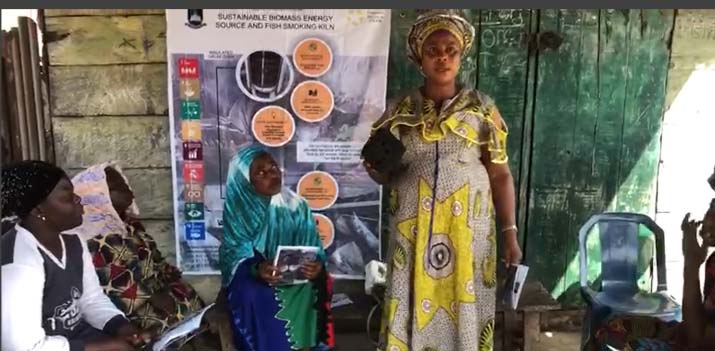
This entry was posted in: Africa, Concepts, Theory, Nigeria, Smoked Fish, Women
